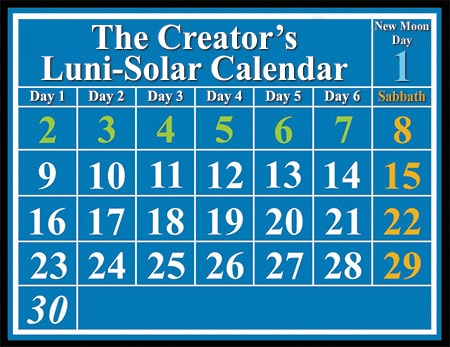
Yahuwah knows the needs of all His creatures. In His love, He has provided specifically for each one. Yahuwah knew that man should not work continuously without interruption. Knowing our weakness and our need to rest as well as our need to obey, He segmented, or divided, time. The shortest segment of time is the DAY/NIGHT cycle, divided by daylight and darkness. The next segments are the WEEK and the MONTH governed by the LUNATION of the moon. After that come the four SEASONS, the summer and winter solstices, and spring and fall equinoxes that divide a solar YEAR. These segments of time are out of the hands of man, being under the direct control of the Creator and governed by the movements of the heavenly bodies.
 "Then [Elohim] said, 'Let there be lights in the firmament of the heavens to divide the day from the night; and let them be for signs and seasons, and for days and years . . .' and it was so." (Genesis 1:14, 15, NKJV)
"Then [Elohim] said, 'Let there be lights in the firmament of the heavens to divide the day from the night; and let them be for signs and seasons, and for days and years . . .' and it was so." (Genesis 1:14, 15, NKJV)
Each lunation was to be segmented by four Sabbaths – six work days with worship on the seventh.
Remember the Sabbath day, to keep it holy. Six days shalt thou labour, and do all thy work: But the seventh day is the Sabbath of Yahuwah thy Eloah: . . .
For in six days Yahuwah made heaven and earth, the sea, and all that in them is, and rested the seventh day: wherefore Yahuwah blessed the Sabbath day, and hallowed it. (See Exodus 20:8-11.)
Yahuwah loves liberty and desires freedom for all His children. He commanded that the lunation, or month, be segmented by four Sabbaths but that segmentation was put into the hands of men so that men could show their allegiance to the Elohim of Heaven by their obedience to the 4th commandment. While the Sabbath roughly follows the phases of the moon, it is not as clear and distinct a division of time as that of the day or the month. Yahuwah chose to leave this less defined, giving to man the opportunity to obey or disobey, depending upon what is in his heart to do.
Those who love their Maker and seek to honor Him worship on the seventh day of the week. Their lunation is broken into four seven-day weeks with a “translation” day in 30-day months. Those who wish to rebel against the clear divine command are given the freedom to do so. A 30-day lunation can be divided into three 10-day weeks, as done in the calendar of the French Republic from 1793 to 1806 when the French government sought to de-Christianize France by getting away from a seven-day week. It can also be divided into six weeks of five days each.
Worship on the seventh-day of a seven day week within the luni-solar calendar is a sign of allegiance to the Creator. It acknowledges Him as the Life- and Law-giver to whom obedience, love and devotion are owed. The spiritual purpose for segmenting time is to allow man time for self-evaluation. Every seventh-day Sabbath brings one face-to-face with the purity and holiness of Yahuwah. This throws into sharp contrast one’s own failings and deformities. In the face of divine holiness, the repentant sinner exclaims:
“Woe is me, for I am undone! Because I am a man of unclean lips, And I dwell in the midst of a people of unclean lips; For my eyes have seen the King, [Yahuwah] of hosts.” (Isaiah 6:5, NKJV)
An additional worship day was given each lunation so that a person could examine where he had failed in the past lunation and to make resolutions for the up-coming lunation. This worship day is New Moon Day on the first  of every month and comes before the work week which starts on the second of the month. New Moon Day is a time to meditate and consider one’s spiritual status. How did it go in the past lunation? What do I want to do differently to bring my will and my life more in line with the will of my Creator? It is a time to seek forgiveness for past failings and help for the coming month. A prayer journal can be very useful, when updated every New Moon. People make New Year’s resolutions but they seldom keep them more than one or two months. Yahuwah understood this human failing and gave us the opportunity to refine and build on our resolutions every new month.
of every month and comes before the work week which starts on the second of the month. New Moon Day is a time to meditate and consider one’s spiritual status. How did it go in the past lunation? What do I want to do differently to bring my will and my life more in line with the will of my Creator? It is a time to seek forgiveness for past failings and help for the coming month. A prayer journal can be very useful, when updated every New Moon. People make New Year’s resolutions but they seldom keep them more than one or two months. Yahuwah understood this human failing and gave us the opportunity to refine and build on our resolutions every new month.
The modern Gregorian calendar, like the Julian calendar before it, has months that are completely divorced from the cycles of the moon. Thus, New Moon Days do not exist in this alternate method of time-keeping. However, this does not excuse anyone from returning worship to Yahuwah on New Moon Days.
"The New Moon is still, and the Sabbath originally was, dependent upon the lunar cycle . . . Originally, the New Moon was celebrated in the same way as the Sabbath; gradually it became less important while the Sabbath became more and more a day of religion and humanity, of religious meditation and instruction, of peace and delight of the soul." (Universal Jewish Encyclopedia, "Holidays," p. 410.)
New Moons are in a class of worship day all by themselves. They were times of thanksgiving and rejoicing in Heaven’s bounty. Anciently, they were days of feasting as well. The prohibitions against cooking on Sabbaths did not apply to New Moons and devout Israelites who fasted on other days, never fasted on a New Moon. Work for Yahuwah can be performed on New Moons. After the Tabernacle had been constructed in the Wilderness, Moses assembled all of the disparate parts on a New Moon:
"And it came to pass in the first month in the second year, on the first day of the month, that the tabernacle was reared up. And Moses reared up the tabernacle, and fastened his sockets, and set up the boards thereof, and put in the bars thereof, and reared up his pillars. And he spread abroad the tent over the tabernacle, and put the covering of the tent above upon it; as [Yahuwah] commanded Moses." (Exodus 40:17-19, KJV)
 |
|
No income-generating commerce is to be done on New Moon Day. |
However, no income-generating commerce may be done. The defiant heart never appreciates the opportunities Heaven has provided for time spent with the Creator. Centuries later, rebellious Israel bemoaned the “lost” business opportunities when Sabbaths and New Moons came.
"When will the New Moon be past, That we may sell grain? And the Sabbath, That we may trade wheat? Making the ephah small and the shekel large, Falsifying the scales by deceit, That we may buy the poor for silver, And the needy for a pair of sandals—Even sell the bad wheat?" (Amos 8:5, 6, NKJV)
Such an attitude is high treason against the government of Heaven. New Moon Days, like seventh-day Sabbaths, are times of holy convocation and the rejection of these holy days was directly responsible for Israel’s overthrow by Assyria. The very next verses state:
"[Yahuwah] has sworn by the pride of Jacob: 'Surely I will never forget any of their works. Shall the land not tremble for this, And everyone mourn who dwells in it?' " (Amos 8:7, 8, NKJV)
While Yahuwah graciously “winks” at times of ignorance, knowing disobedience is treated as the rebellion that it is. Israel’s worship degenerated into a form that had no spiritual value whatsoever.
Yahuwah rejected Israel’s worship, stating:
"I hate, I despise your feast days, and I will not smell in your solemn assemblies. Though ye offer me burnt offerings and your meat offerings, I will not accept them: neither will I regard the peace offerings of your fat beasts. Take thou away from me the noise of thy songs; for I will not hear the melody of thy viols." (Amos 5:21-23, KJV)
While Israel went through the motions of worshipping Yahuwah, they were, in fact, honoring Saturn as had their forefathers in the Wilderness at the Golden Calf. Yahuwah demanded:
"Did you offer Me sacrifices and offerings in the wilderness forty years, O house of Israel? You also carried Sikkuth your king and Chiun, your idols, the star of your gods, which you made for yourselves. Therefore I will send you into captivity beyond Damascus, says [Yahuwah] whose name is [Yahuwah] of hosts." (Amos 5:25-27, NKJV)
Chiun – “Another name for the god Saturn.” (The New Strong’s Exhaustive Concordance of the Bible.)
 |
|
Sadly, many professed Christians are today rejecting the advancing light on Yahuwah's sacred calendar. |
Ancient Israel, like modern spiritual Israel, rejected Yahuwah’s New Moon Days and returned worship on Saturn’s day, or Saturday.
“Prayer to the planets on their respective days was a part of the worship of the heavenly bodies.” (R. L. Odom, Sunday in Roman Paganism, p. 158)
Such worship is not acceptable to Yahuwah. In Amos, right after denouncing them for worship of Saturn, Yahuwah declares:
"Woe to them that set at nought Sion, and that trust in the mountain of Samaria . . . Ye who are approaching the evil day, who are drawing near and adopting false sabbaths; . . . Therefore now shall they depart into captivity . . . For [Yahuwah] has sworn by himself, saying, Because I abhor all the pride of Jacob . . . I will cut off his city with all who inhabit it." (Amos 6:1, 3, 7-8, Septuagint)
The same fate awaits all who cling to worship on Saturday of the modern counterfeit calendar, ignoring the obligation of observing the Sabbaths and New Moons of the Biblical luni-solar calendar.
Worship on ALL the sabbaths, or rests, of Yahuwah, is the distinguishing mark that sets His people apart.
"Moreover also I gave them my sabbaths, to be a sign between me and them, that they might know that I am [Yahuwah] that sanctify them." (Ezekiel 20:12, KJV)
Indeed, returning worship to the Creator on Sabbaths and New Moons will be one of the joys of the Redeemed in the new earth throughout all eternity.

Commit now to worshiping Yahuwah on all His holy rests, Sabbaths, New Moons and annual feasts. Untold joys await those who seek fellowship with Him in whom all the fullness of Life dwells.
Related Content: